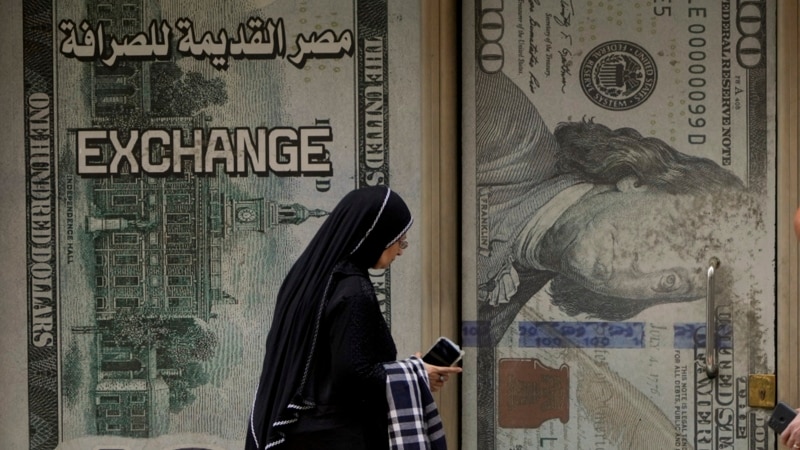A series of billions of dollars in loans and investments announced in recent weeks are helping Egypt’s struggling economy. Analysts, however, are taking a wait-and-see approach before declaring an end to the financial crisis exacerbated by the fallout from Israel’s war with Hamas.
The most striking is the jaw-dropping UAE invests $35 billionmainly dedicated to developing tourist facilities along the Mediterranean coast.
The commitment is seen as reflecting the UAE’s confidence in Egypt’s potential as a lucrative investment destination and underlines the strategic partnership between the two countries, experts said.
Also this month, EU announces $8 billion package Grants and loans as part of a broader agreement aimed at addressing immigration issues. The World Bank and the International Monetary Fund have also launched loan programs totaling $14 billion since early March.
Robert Mogilnicki, senior resident scholar at the Arab Gulf States Institute in Washington, told VOA that the investments were a mix of opportunistic economic considerations and strategic political motivations.
As for the loans, he said they reflected a country desperate for an economic lifeline but also appearing ready to make some painful reforms.
Mogilnicki, an expert on Middle East political economy, said Egypt needs significant investment to boost confidence in its economy, encourage other investors and create momentum for negotiations on other forms of economic support.
He said the UAE investment “is a big… figure, but it’s too early to determine its exact impact”. “It really reveals the enduring importance of Egypt’s relations with the Gulf, particularly with the UAE.”
“I’m not sure long-term planning is the key component here. Going forward, Egyptian policymakers will need to ensure that planned development projects are sustainable and deliver clear benefits to the economy and the Egyptian people.”
In early March, the International Monetary Fund announced that it would provide an $8 billion bailout package to Egypt, which has suffered a sharp drop in tourism revenue due to the Gaza war and reduced revenue from the Suez Canal due to Houthi armed attacks on Red Sea shipping.
According to the International Monetary FundEgypt’s promised reforms include the implementation of a new exchange rate regime, fiscal and monetary policy discipline, and initiatives aimed at engaging the private sector.
Egypt is currently grappling with inflation of around 36%, prompting the International Monetary Fund to call for “further tightening of monetary policy to reduce inflation and [steps to] Reversing recent dollarization trends. ”
People often say Egypt is too big to fail, but also too big to be bailed out, Mogilnicki said. This means that many internal and external actors and institutions will need to be involved in stabilizing the Egyptian economy, supporting economic reforms, and steering the country toward sustainable growth and development.
At the same time, the World Bank has committed $6 billion in three years, splitting support equally between the public and private sectors. The bank said its new plan would focus on “increasing opportunities for the private sector to participate in the economy” and “improving the efficiency and effectiveness of public resource management”.
Despite these investments, Egypt faces a history of financial mismanagement and economic instability, leaving many Egyptians anxious about the future, as reflected in the surge in gold speculation.
Cairo resident Abdel Rahman Said told VOA that people like him don’t see the country’s economic progress. “Instead we see the worst-case scenario, with prices continuing to rise and the value of the currency remaining low. We don’t know what the truth is.”
Financial experts say the influx of money will not put Egypt on the path to economic revival without a concerted effort to address underlying structural problems and implement effective reforms.
David Lubin, a senior fellow at the Global Economics and Finance Program at Chatham House in London, told VOA that Egypt risks being overwhelmed by short-term speculative capital inflows.
He said these were economically useless as they could be easily reversed and made it more difficult for the Central Bank of Egypt to implement a proper floating exchange rate system.
“Such speculative capital inflows tend to exaggerate exchange rate fluctuations beyond levels justified by Egypt’s fundamentals,” Lubin explained.
Lubin’s suggestion is that Egyptian authorities use tax and regulatory tools to limit speculative capital inflows, perhaps by increasing withholding taxes or requiring foreign investors to deposit some of their funds with the central bank as free reserve requirements.
“This will help limit the inflow of speculative capital and enable [Egyptian currency] There is less volatility in the context of a flexible exchange rate regime,” he said. “I think it is really important to introduce a flexible regime. Egyptian policymakers have long argued that a “stable country” requires a “stable currency.” This is simply wrong. “
Follow us on Google news ,Twitter , and Join Whatsapp Group of thelocalreport.in
